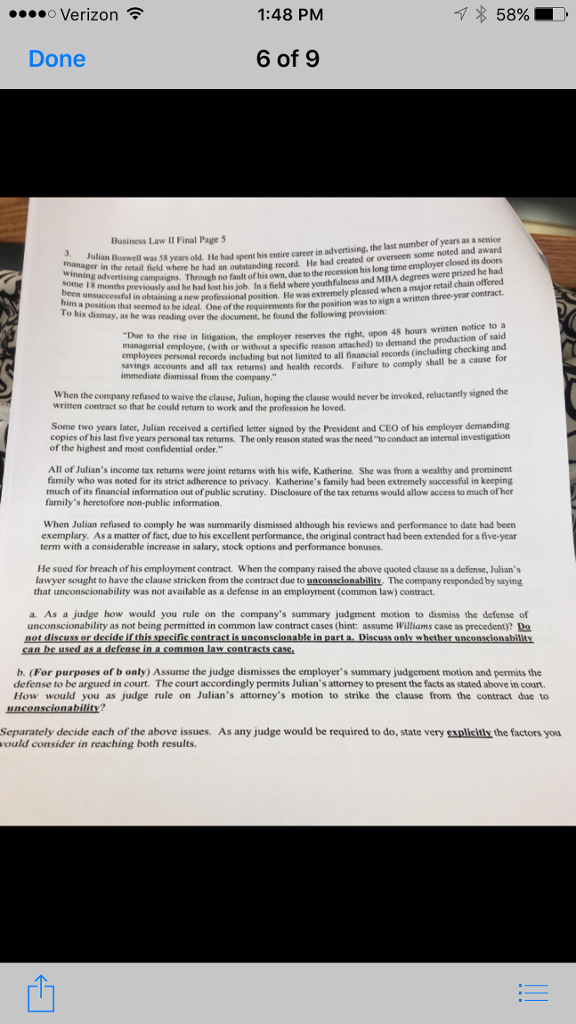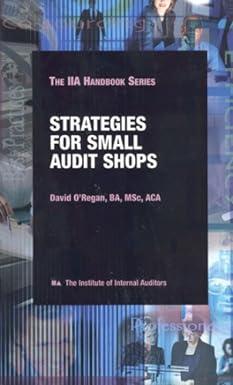
Julian Boswell was 58 years old. He had spent his entire in advertising, the last number of years as a senior manager in the retail field where he had an outstanding record. He had created or overseen some noted and award winning advertising campaigns. Through no fault of his own, due to the recession his long time employer closed its doors some 18 months previously prized he had lost his job. In a field where youthfulness and MBA degrees were prized he had been unsuccessful in obtaining a new professional position. He was extremely pleased when a major retail chain offered him a position that seemed to be ideal. One of the requirements for the position was to sign a written three-year contract. To his dismay, as he was reading over the document, he found the following provision: "Due to the rise in litigation, the employer reserves the right, upon 48 hours notice to a managerial employee, (with or without a specific reason attached) to demand the production of said employee, personal records including but not limited to all financial records (including checking and saving accounts and all tax returns) and health records. Failure to comply shall be a cause for immediate dismissal from the company." When the company refused to waive the clause, Julian, hoping the clause would never be invoked, reluctantly signed the written contract so that he could return to work and the profession he loved. Some two years later, Julian received a certified letter signed by the President and CEO of his employer demanding copies of his last five years personal tax returns. The only reason stated was the need "to conduct an internal investigation of the highest and most confidential order." All of Julian's income tax returns were joint returns with his wife, Katherine. She was from a wealthy and prominent family who was noted for its strict adherence to privacy. Katherine's family had been extremely successful in keeping much of its financial information out of public scrutiny. Disclosure of the tax returns would allow access to much of her family's heretofore non-public information. When Julian refused to comply he was summarily dismissed although his reviews and performance to date had been exemplary. As a matter of fact, due to his excellent performance, the original contract had been extended for a five-year term with a considerable increase in salary, stock options and performance bonuses. He sued for breach of his employment contract. When the company raised the above quoted clause as a defense, Julian's lawyer sought to have the clause stricken from the contract due to unconscionability. The company responded by saying that unconscionability was not available as a defense in an employment (common law) contract. a. As a judge how would you rule on the company's summary judgment motion to dismiss the defense of unconscionability as not being permitted in common law contract cases. Do not discuss or decide if this specific contract is unconscionability in part a. Discuss only whether unconscionability can be used as a defense in a common law contracts case. b. (For purposes of b only) Assume the judge dismisses the employer's summary judgement motion and permits the defense to be argued in court. The court accordingly permits Julian's attorney to present the facts as stated above in court. How would you as judge rule on Julian's attorney's motion to strike the clause from the contract due to unconscionability? Separately decide each of the above issues. As any judge would be required to do, state very explicitly the factors you would consider in reaching both results. Julian Boswell was 58 years old. He had spent his entire in advertising, the last number of years as a senior manager in the retail field where he had an outstanding record. He had created or overseen some noted and award winning advertising campaigns. Through no fault of his own, due to the recession his long time employer closed its doors some 18 months previously prized he had lost his job. In a field where youthfulness and MBA degrees were prized he had been unsuccessful in obtaining a new professional position. He was extremely pleased when a major retail chain offered him a position that seemed to be ideal. One of the requirements for the position was to sign a written three-year contract. To his dismay, as he was reading over the document, he found the following provision: "Due to the rise in litigation, the employer reserves the right, upon 48 hours notice to a managerial employee, (with or without a specific reason attached) to demand the production of said employee, personal records including but not limited to all financial records (including checking and saving accounts and all tax returns) and health records. Failure to comply shall be a cause for immediate dismissal from the company." When the company refused to waive the clause, Julian, hoping the clause would never be invoked, reluctantly signed the written contract so that he could return to work and the profession he loved. Some two years later, Julian received a certified letter signed by the President and CEO of his employer demanding copies of his last five years personal tax returns. The only reason stated was the need "to conduct an internal investigation of the highest and most confidential order." All of Julian's income tax returns were joint returns with his wife, Katherine. She was from a wealthy and prominent family who was noted for its strict adherence to privacy. Katherine's family had been extremely successful in keeping much of its financial information out of public scrutiny. Disclosure of the tax returns would allow access to much of her family's heretofore non-public information. When Julian refused to comply he was summarily dismissed although his reviews and performance to date had been exemplary. As a matter of fact, due to his excellent performance, the original contract had been extended for a five-year term with a considerable increase in salary, stock options and performance bonuses. He sued for breach of his employment contract. When the company raised the above quoted clause as a defense, Julian's lawyer sought to have the clause stricken from the contract due to unconscionability. The company responded by saying that unconscionability was not available as a defense in an employment (common law) contract. a. As a judge how would you rule on the company's summary judgment motion to dismiss the defense of unconscionability as not being permitted in common law contract cases. Do not discuss or decide if this specific contract is unconscionability in part a. Discuss only whether unconscionability can be used as a defense in a common law contracts case. b. (For purposes of b only) Assume the judge dismisses the employer's summary judgement motion and permits the defense to be argued in court. The court accordingly permits Julian's attorney to present the facts as stated above in court. How would you as judge rule on Julian's attorney's motion to strike the clause from the contract due to unconscionability? Separately decide each of the above issues. As any judge would be required to do, state very explicitly the factors you would consider in reaching both results







